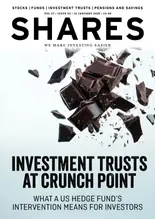
THIS IS AN ADVERTISING FEATURE
Capital at risk. The value of investments and the income from them can fall as well as rise and are not guaranteed. Investors may not get back the amount originally invested.
As developed markets see higher interest rates feeding through into the real economy, activity is likely to slow. But there are stronger prospects for investment growth in many emerging markets, particularly those outside China. Monetary tightening is already underway in Latin America and Eastern Europe, with inflationary pressures substantially controlled. This should support domestic economic growth and may suggest a better outlook for the next 12 months.
Why invest in smaller emerging markets?
Many of the factors supporting the smaller emerging markets where we invest are structural rather than cyclical. For example, we see a key support from the shifting geopolitical landscape. The world is splitting into three groups: those aligned with China, those aligned with the US - and everyone else. This third group are uniquely positioned to benefit from their ability to trade with both blocs and are already grabbing a greater share of global Foreign Direct Investment (FDI) flows. This group includes many of the countries in which we invest – Indonesia, Vietnam, Thailand and even Bangladesh.
These smaller emerging markets can also be an important source of investment income. Companies in these countries are often cash generative, but have fewer investment options, so cash is often returned to shareholders as dividends.
Why the transition from fossil fuels is reducing frontier market debt
The transition away from fossil fuels is also providing an economic boost for many smaller emerging markets[1]. For instance, Indonesia is the world’s largest exporter of nickel, vital in the making of batteries for electric vehicles[2]. As the value of nickel exports multiples, it improves the country’s current account balance. This is making Indonesia less reliant on borrowing from abroad and allowing it to draw in foreign capital. The knock-on effect should be increased domestic liquidity and higher economic growth.
The country has been deftly governed by President Joko Widodo, who has increased the country’s investment appeal through sound economic leadership and a proactive industrial strategy. The country is poised to sustain its high GDP growth. Most recently the US and Indonesia have been discussing a critical minerals deal, which would attract further FDI once confirmed. Elections in February are a potential stumbling block, with the two-term limit meaning Widodo’s reign will end. However, we expect his successor to maintain the current direction of economic policy.
Political risk but economic reward?
There are other countries with greater political risk. In Bangladesh, for example, Prime Minister Sheikh Hasina controversially secured her fourth term in January[3]. However, the country has demonstrated resilient growth over the past 10 years, in spite of a currency crisis and severe floods. Bangladesh stands out as an alternative manufacturing destination and is yet another ‘world in three’ beneficiary. It has been able to scale mass manufacturing and is the world’s second largest garment exporter after China[4]. Business owners are looking to broaden out beyond textiles to other consumer products. For Bangladesh this should power exports and generate self-sustaining growth.
New opportunities and potential risks for 2024
We are finding opportunities for investment growth in Eastern Europe, particularly in Poland and Hungary and particularly in the financial sector. Banks are now starting to cut rates, which should accelerate economic growth. We remain negative on Turkey. To put the country on sounder economic footing we need to see inflation come down and a sharp adjustment in both the currency and interest rates to more sustainable levels, none of which look likely. We have moved away from the Middle East, having held an overweight position for much of 2023. Our investment thesis had played out and our holdings there had started to look more expensive.
We do not regret the absence of China in our portfolios. China remains a dominant part of many emerging market portfolios, but in our view we are entering a ‘great reversal’ where the core drivers of China’s success over the past 20 years, ranging from globalisation to urbanisation, start to head in the opposite direction. Real estate, fixed asset investment and consumer confidence all look troubled. Market expectations still need to adjust to this new reality.
For more information on this Trust and how to access the potential opportunities presented by frontier markets, please visit: www.blackrock.com/uk/brfi
Risk Warnings
Marketing Material.
Capital at risk. The value of investments and the income from them can fall as well as rise and are not guaranteed. Investors may not get back the amount originally invested.
Past performance is not a reliable indicator of current or future results and should not be the sole factor of consideration when selecting a product or strategy.
Changes in the rates of exchange between currencies may cause the value of investments to diminish or increase. Fluctuation may be particularly marked in the case of a higher volatility fund and the value of an investment may fall suddenly and substantially. Levels and basis of taxation may change from time to time and depend on personal individual circumstances.
Investors should refer to the prospectus or offering documentation for the funds full list of risks.
Trust Specific Risks
Exchange rate risk: The return of your investment may increase or decrease as a result of currency fluctuations.
Counterparty risk: The insolvency of any institutions providing services such as safekeeping of assets or acting as counterparty to derivatives or other instruments, may expose the Fund to financial loss.
Currency risk: The return of your investment may increase or decrease as a result of currency fluctuations.
Emerging Markets risk: Emerging market investments are usually associated with higher investment risk than developed market investments. Therefore, the value of these investments may be unpredictable and subject to greater variation.
Frontier Markets risk: The Company invests in a number of developing emerging markets (“Frontier Markets”). Frontier Markets tend to be more volatile than more established markets and therefore present a higher degree of risk as they are less well regulated and may be affected by political and social instability and other factors.
Gearing risk: Investment strategies, such as borrowing, used by the Trust can result in even larger losses suffered when the value of the underlying investments fall.
Important Information
Issued by BlackRock Investment Management (UK) Limited, authorised and regulated by the Financial Conduct Authority. Registered office: 12 Throgmorton Avenue, London, EC2N 2DL. Tel: + 44 (0)20 7743 3000. Registered in England and Wales No. 02020394. For your protection telephone calls are usually recorded. Please refer to the Financial Conduct Authority website for a list of authorised activities conducted by BlackRock.
BlackRock has not considered the suitability of this investment against your individual needs and risk tolerance. To ensure you understand whether our product is suitable, please read the fund specific risks in the Key Investor Document (KID) which gives more information about the risk profile of the investment. The KID and other documentation are available on the relevant product pages at https://www.blackrock.co.uk/its. We recommend you seek independent professional advice prior to investing.
This material is marketing material. The Company is managed by BlackRock Fund Managers Limited (BFM) as the AIFM. BFM has delegated certain investment management and other ancillary services to BlackRock Investment Management (UK) Limited. The Company’s shares are traded on the London Stock Exchange and dealing may only be through a member of the Exchange.
The Company will not invest more than 15% of its gross assets in other listed investment trusts. SEDOL™ is a trademark of the London Stock Exchange plc and is used under licence.
Net Asset Value (NAV) performance is not the same as share price performance, and shareholders may realise returns that are lower or higher than NAV performance.
The BlackRock Frontiers Investment Trust plc currently conducts its affairs so that its securities can be recommended by IFAs to ordinary retail investors in accordance with the Financial Conduct Authority’s rules in relation to non-mainstream investment products and intends to continue to do so for the foreseeable future. The securities are excluded from the Financial Conduct Authority’s restrictions which apply to non-mainstream investment products because they are shares in an investment trust.
Investors should understand all characteristics of the funds objective before investing. For information on investor rights and how to raise complaints please go to https://www.blackrock.com/corporate/compliance/investor-right available in local language in registered jurisdictions.
Any research in this material has been procured and may have been acted on by BlackRock for its own purpose. The results of such research are being made available only incidentally. The views expressed do not constitute investment or any other advice and are subject to change. They do not necessarily reflect the views of any company in the BlackRock Group or any part thereof and no assurances are made as to their accuracy.
This material is for information purposes only and does not constitute an offer or invitation to anyone to invest in any BlackRock funds and has not been prepared in connection with any such offer.
© 2024 BlackRock, Inc. All Rights reserved. BLACKROCK, BLACKROCK SOLUTIONS and iSHARES are trademarks of BlackRock, Inc. or its subsidiaries in the United States and elsewhere. All other trademarks are those of their respective owners.
[1] Morgan Stanley – the energy transition opportunity in emerging markets – 31 August 2023
[3] BBC - Bangladesh election: PM Sheikh Hasina wins fourth term in controversial vote – 8 January 2024
[4] Textile Today – Bangladesh retains 2nd position in garment exports – 2 August 2023
MKTGH0324E/S-3420062




